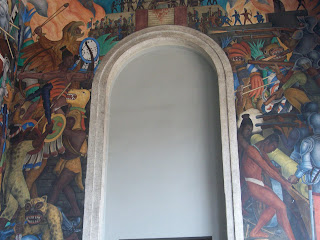By Vinnie Rodriguez
On a Sunday morning, we visited an indigenous community in the municipality of Tepoztlán, Mexico. As we met with one of the community leaders in his house, he shared with us why his piece of land and the general land is so important to his community. We talked a lot about how various laws and policies have led to the privatization of this land and the affects it has on the rights of the indigenous community. According to him, it is not viewed positively. He defined private property as “an invention of oppression that systems of power have made up”, and that oppression is unfortunately a part of the indigenous reality that they must face day-to-day. Here’s an explanation of what I mean.
When the Spanish first arrived in Mexico during the Spanish Conquest, they took over Mexico—especially, the land.

[This part of the mural in the Palacio de Cortez by Diego Rivera represents the Spanish Conquest and how the indigenous people are sometimes represented by animals in the image]
From then on, the Spanish considered the Mexican natives as animals and used them for forced labor for their own economic benefit. Because the natives/indigenous weren’t seen as people, they had no right to the land which they originally had inhabited, and Spanish were considered to be at the top of the class system while the indigenous were left at the bottom of the pit.

[This part of Diego Rivera’s mural depicts the obvious distinction of class and duty between the Spanish and the indigenous people.]
As a result, it has been a struggle for indigenous people to keep their land. Article 27 was one important step. It stated that communal and ejido land cannot be taken, bought, or sold. However, in 1990, President Carlos Salinas de Gordali reversed Article 27 in an effort to put NAFTA in place, which meant that constitutional rights to ejido and communal land were eliminated and land can now be privatized or sold.
Not only are foreign institutions developing without considering indigenous values, but their very own Mexican government has a history of not including the indigenous community in economic development. Sometimes, it’s because of a clash in cultural values as well. For example, Chiapas has 33% of its population without light, but provides 52% of the electric population in the country. Why? The community leader says it’s because they are considered an obstacle to the nation’s plan. The government says they don’t want to develop, but it’s because the plans don’t line up with the values of their society. For example, after receiving dozens of letters from the indigenous community leader, the government finally came to them with a development project idea to build fish farms, and they laughed and refused to allow it unless the government would bring sufficient water into their community first. The government used that as an excuse to say the indigenous didn’t want to develop. This
 miscommunication along with the clash of cultural principles is what causes so much trouble for the indigenous communities. When the Spanish took the ejido (communal) land, they paid gold in exchange, but they didn’t understand the significance of the land to the indigenous.
miscommunication along with the clash of cultural principles is what causes so much trouble for the indigenous communities. When the Spanish took the ejido (communal) land, they paid gold in exchange, but they didn’t understand the significance of the land to the indigenous.
[This painting was done on one of the walls of the dorm where we stay here in Mexico. What does it make you think about privatization and globalization?]
Because of the examples above, it is very difficult for an indigenous community to have a say in their own land and their own rights when they have to deal with the obstacles of their very own government and the rapid pace of globalization fever of foreign investors to buy out land. It almost seems to me as though foreign corporations and investors perceive themselves to have more rights over the ejido (communal) land than the indigenous communities do. Privatization is benefitting big corporations and big government who have the (financial) power to make these transactions. From the surface, Mexico’s economy has historically boomed from NAFTA, which is all foreigners need to know to be convinced into investing, and small Mexican communities can thus be ignored. The real question is about cash flow: who does the money really go to? How can a small indigenous town become a voice and beneficiary in the global decision-making process? Do they have to change their beliefs and customs so to favor the government and thus then be included in decisions? Or do they stand their ground, protect their community, and risk resistance by the government and pressure from global corporations? If economic prosperity is measured by how much land one can buy, then will they ever be financially successful if they believe in keeping their land as a part of the community? However, we also need to look at the issue from another side. Would it necessarily be a good thing if the globalization/privatization process were reversed? Will that actually help the indigenous community or Mexico as a whole? Does Mexico need more or less foreign investment if it wants to “move up the ranks”?


